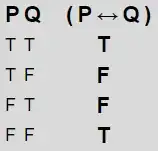If we are given that propositions P and Q can never be true, is it still accurate to say that P and Q are necessary and sufficient for each other, and why?
I am conflicted here, as the statement P iff Q is true here and I have learned that this also means P and Q are necessary and sufficient for each other (for context, I have learnt that P is necessary for Q if P must be true to conclude Q is true, and that P is sufficient for Q if Q must be true to conclude that P is true); however, it seems counterintuitive to stipulate conditions for propositions being true (by deeming other propositions as necessary or sufficient for them) if these are never relevant to the situation, as these propositions are always false anyway.
I would appreciate an answer grounded in an explanation of necessity and sufficiency.
